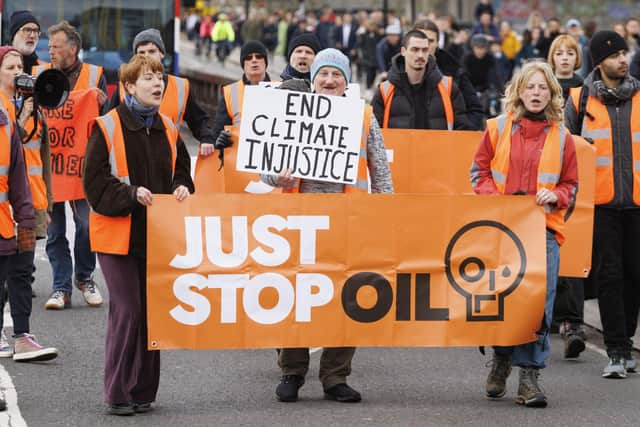When one protest is disrupted by another, picking a side can be a complicated business – Kate Copstick
This week has been a complicated one for all right-thinking people. In the ongoing value judgement wars for the moral high ground, it is getting increasingly difficult to know which way is up.
This week alone, researcher Maya Forstater – who tweeted her views on the “immutability” of biological sex and was, subsequently, let go by the Centre for Global Development think tank – was awarded a six-figure payout after an employment tribunal found she experienced discrimination and victimisation at work. The judge found her views are a “philosophical belief” protected by equality legislation and should be “tolerated in a pluralist society”.
Advertisement
Hide AdAdvertisement
Hide Ad“My case has exposed institutionalised discrimination against, and the routine abuse and smearing of, people with perfectly ordinary beliefs about the material reality of sex,” she said. Other opinions are, of course, available.


Protest through the medium of marching has been a popular option since at least May 1, 1894, when Coxey's Army converged on Washington from all across America to protest against income inequality. It might have been a risky thing to do, but right and wrong were simpler to define then. And you picked your side.
A little upwards of 500 people marched in the first “carnival parade of protest” in 1972. Again, probably a risky thing to do, but right and wrong were still simpler to define. And you picked your side.
This past weekend, in London, Pride Month climaxed colourfully with the time-honoured march through the city centre. It is a gloriously colourful affair during which 73.6 per cent (approx) of the Western world's fake Swarovski crystals are gathered within two postcodes to symbolise homosexual equality. Equality here, anyway. More than 30,000 marched, danced and waved banners for the Gay Good. Which is definitely on the side of right.
But suddenly, they themselves were subject to banner waving for the ‘global good’ as a small but forceful group from Just Stop Oil halted the parade by lying in front of the Coca-Cola float to protest Gay Pride's involvement with a company with their uniquely appalling pollution record – named as the number one plastic polluter in the world for the fifth year running. To be fair, you are comprehensively spoilt for choice when it comes to atrocities of every hue in the Coca-Cola corporate bio. But I digress. Although I heartily recommend that you get a copy of Mark Thomas's brilliant 2008 book Belching Out The Devil.
London mayor Sadiq Khan has described Just Stop Oil as a “really important pressure group”. However everybody's favourite humanitarian Cruella Braverman has pronounced their protests to be “disruption from a selfish minority” and extended the powers of police to shut down such actions.
As far back as 2010, writer and activist Hannah Dee argued that Pride had reached “the point that London Pride – once a militant demonstration in commemoration of the Stonewall riots – has become a corporate-sponsored event far removed from any challenge to the ongoing injustices that we [the LGBT community] face”.
This year Just Stop Oil said: “These partnerships embarrass the LGBTQ+ community at a time when much of the cultural world is rejecting ties to these toxic industries. High-polluting industries and the banks that fund them now see Pride as a useful vehicle for sanitising their reputations.” On the other hand, Will De’Athe-Morris, a spokesperson for Pride in London, was reported as saying: “Pride is a protest and pride is a celebration. Anyone who tries to disrupt that protest and parade is really letting down those people who use this space once a year to come together to celebrate and protest for those rights.”
Advertisement
Hide AdAdvertisement
Hide AdWhen you are fighting any 'good fight', finding financial support that is decent in all senses of the word is increasingly complicated, particularly if you want to play in the big boys' yard. All too often it has become a question of the extent to which one is prepared to compromise morals to get the necessary practical support to do something good. And big. Ends justifying the means? It shouldn't be, but it all too frequently is. But selling your good cause to the bad guys is not the only way to get your message out there.
Perhaps we might cast the old side eye at our friends across the Channel. Yes, they do wine and cheese and patisseries well, but they lead the world in evincing disapproval. Their sneers are the most effective in the world, from the elegance of the moue to the labial acrobatics of the full lip curl.
When they protest, they go for it. From the Revolution on down the years. If they think something is wrong, they, the people, get up, get out there and change it. They seem better adapted to keeping it personal, and not making the protesting as corporate as whatever it is they are protesting about. Personal is powerful.
The sheer force of the recent reaction to the point-blank shooting of 17-year-old Nahel Merzouk in Paris is something that could just never happen in the UK. I am not advocating mass violence as an answer to anything. However, much as our 'good guys' would say that all lives matter, they would never take their outrage over the point-blank shooting of one young man to the streets nationwide, across 220 towns and cities.
But personal is powerful. And a plea from the victim's grandmother to stop the violence is, as of today, calming things down more than anything else has. Doing the right thing is never easy. Knowing what that right thing is frequently no easier. But you people are reading The Scotsman! You are halfway there already.
Comments
Want to join the conversation? Please or to comment on this article.
